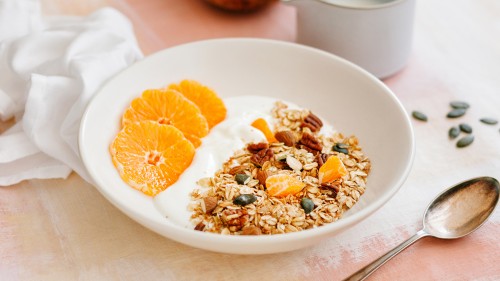Healthy Eating for Seniors: A Comprehensive Guide
Last Updated on October 4, 2021
Medically Reviewed by Anthony Dugarte, MD
Eating a nutritious diet is always beneficial for your health. But it can be even more essential as we age. Eating healthy into your senior years can help you maintain optimal mental and physical health and improve your quality of life.


Each life stage has its own nutrition needs and challenges. As a child, you have to support growth. As an adult, you might struggle with your energy and weight or want to prevent chronic diseases.
This is no different for seniors who want to continue to live a long and healthy life.
Recent research shows that older adults who eat a more balanced diet have improved longevity and overall health. (1)
As we grow older, our metabolism and nutritional needs may change. Additionally, medical conditions or prescription medications may necessitate following a particular diet.
For example, some may need to avoid certain foods to reduce potential drug-nutrient interactions.
While everyone has their own individual needs, it’s always beneficial to choose more nutritious foods. This can help you to stay as healthy and active as possible into your senior years.
Here are several ways you can continue to follow a healthy diet as a senior, despite any challenges that come your way.
Focus on Nutrient-Dense Foods
When it comes to your diet, it’s helpful to choose more nutrient-dense foods.
Nutrient-dense foods are foods that are packed with health-promoting nutrients, such as fruits and vegetables.
This is in contrast to nutrient-poor foods that don’t provide much nutrition, such as potato chips or cookies.
If you find that your appetite and intake have declined, it’s vital to choose more nutrient-dense foods. In this way, you can maximize the food you are taking in.
Other nutrient-dense foods include lean proteins such as fish and chicken, beans, lentils, fruits, vegetables, and whole grains.
Always including these healthy foods on your plate will make it easier to get in enough of what your body needs.
Also, there are a few essential nutrients that are a priority for seniors:
Vitamin D
Seniors are at an increased risk of vitamin D deficiency due to reduced food intake and sun exposure. Vitamin D offers many health benefits, especially for seniors. (2)
It helps promote healthy bones to keep you physically strong. It also supports a healthy immune system and may even ward off depression. (3)
Vitamin-D-rich foods include dairy products, fatty fish like salmon and sardines, and egg yolks. The recommendation is at least 600–800 IU of vitamin D per day. (4)
Calcium
Calcium is also a priority nutrient for seniors. Some research shows a reduced risk of fractures and osteoporosis with adequate calcium intake. (5)
Vitamin D improves calcium absorption. Therefore, consuming any foods containing both calcium and vitamin D, like dairy products or fatty fish, is worthwhile.
Protein
Adequate protein intake is necessary for proper tissue growth, repair, and maintenance.
While protein needs for seniors may decline with less physical activity, it is still essential to get a certain amount every day to prevent muscle breakdown.
When there is not enough muscle to support the bones, it puts seniors at risk for fractures.
For optimal energy and metabolism, it’s recommended to consume a similar amount of protein per meal.
Maintaining healthy protein levels can help decrease the overall risk of illness and mortality, especially for seniors. (6)
For example, if your daily protein requirements are 60 grams per day, you should be having around 20 grams per meal.
High-quality proteins include lean chicken, fish, low-fat dairy, lentils, beans, and eggs.
Make Mealtimes Social
Research has shown that seniors tend to eat better in a social environment. It is much more enjoyable to eat with friends than alone. (7)
Our environment plays a significant role in our food choices. When we see others eating healthy meals, it tends to motivate us to do the same.
Being social as you age also contributes to improved mental health. When you are happier, you are more likely to want to eat well and take care of yourself. This can indirectly lead to healthier eating habits. (8)
Whenever possible, eat around others in a pleasant, inviting environment. This can support healthier food choices and better food intake overall.
Eat According to Your Medical Needs
If you have been diagnosed with a medical condition such as diabetes, heart disease, or kidney failure, following a particular diet can help manage symptoms and delay disease progression.
This is especially important if you want to avoid or limit the number of medications you have to take.
For example, you may need to reduce your carbohydrate intake or make better carbohydrate choices if you have diabetes.
Or, you may need to reduce your sodium intake with high blood pressure or heart disease and choose more whole foods with no added salt.
Working one-on-one with a registered dietitian can help teach you how to have the healthiest diet possible for your medical condition.
Adjust Your Calorie Intake
As we age, our calorie needs gradually decline. This happens mainly because of muscle mass loss and a decrease in physical activity. (9)
When we have less muscle or lean body mass, our metabolism slows, so we don’t need as many calories to maintain our weight.
If you continue to eat the same number of calories as when you were younger, you may find that you gain weight more easily now.
If this is the case, focusing on diet quality rather than quantity can help support a healthy weight.
When it comes to diet quality, remember to focus on getting in those nutrient-dense foods. It’s also equally as important to enjoy your favorite foods while practicing portion control.
Stay Hydrated
Dehydration is more common in our senior years. This is because as we age, our thirst sensation is weakened, or we may simply forget to drink water. (10)
Dehydration can lead to fatigue, dizziness, heart rate alterations, or urinary tract issues. (11)
To increase water intake, choose more foods high in water content, such as fruits, vegetables, and soups.
Keep a water bottle close by and limit caffeinated beverages that can worsen dehydration.
Consider Supplements
While it is always best to employ a foods-first approach, sometimes supplements can serve as excellent backup insurance.
This can mean adding commercial oral supplements and shakes or vitamin and mineral supplements to fill in the gaps of what may be lacking in your diet.
If you have trouble meeting your needs with food alone, having oral supplements or shakes in the house can be a great addition to your nutritional plan.
Products like Ensure, Glucerna, and Orgain shakes provide calories, protein, and essential vitamins and minerals you may have difficulty getting enough of in your diet.
Furthermore, vitamin and mineral supplements like multivitamins, calcium, or vitamin D may be necessary to meet the demand for these nutrients.
The Bottom Line
It is possible to continue to eat healthy well into your senior years.
When developing a healthy diet for your golden years, try to focus on nutrient density and hydration and always consider any medical conditions you may have.
Supplements may also be beneficial to help increase the nutrient density of your diet.
If you need more nutrition guidance, speak to your healthcare provider and seek the advice of a registered dietitian to help you design a diet that is best for you.
At WellnessVerge, we only use reputable sources, including peer-reviewed medical journals and well-respected academic institutions.
- Dietary Patterns and Survival of Older Adults:
https://www.ncbi.nlm.nih.gov/pmc/articles/PMC3699861/ - Vitamin D deficiency in elderly: Risk factors and drugs impact on vitamin D status:
https://www.ncbi.nlm.nih.gov/pmc/articles/PMC6178567/ - Effect of vitamin D supplementation on depression in elderly patients: A randomized clinical trial:
https://pubmed.ncbi.nlm.nih.gov/30316534/ - The Role of Vitamin D in the Aging Adult:
https://www.ncbi.nlm.nih.gov/pmc/articles/PMC4399494/ - The Role of Calcium in Human Aging:
https://www.ncbi.nlm.nih.gov/pmc/articles/PMC4337919/ - Prognostic Role of Serum Albumin, Total Lymphocyte Count, and Mini Nutritional Assessment on Outcomes After Geriatric Hip Fracture Surgery: A Meta-Analysis and Systematic Review:
https://pubmed.ncbi.nlm.nih.gov/30852065/ - Aspects Influencing Food Intake and Approaches towards Personalising Nutrition in the Elderly:
https://link.springer.com/article/10.1007/s12062-019-09259-1 - Goal B: Better understand the effects of personal, interpersonal, and societal factors on aging, including the mechanisms through which these factors exert their effects:
https://www.nia.nih.gov/about/aging-strategic-directions-research/goal-behavioral-psychological-factors - Nutrition and Aging:
https://www.health.harvard.edu/aging/nutrition-and-aging - Prevention of Dehydration in Independently Living Elderly People at Risk: A Study Protocol of a Randomized Controlled Trial:
https://www.ncbi.nlm.nih.gov/pmc/articles/PMC4671176/ - Hydration health literacy in the elderly:
https://www.ncbi.nlm.nih.gov/pmc/articles/PMC5734130/






